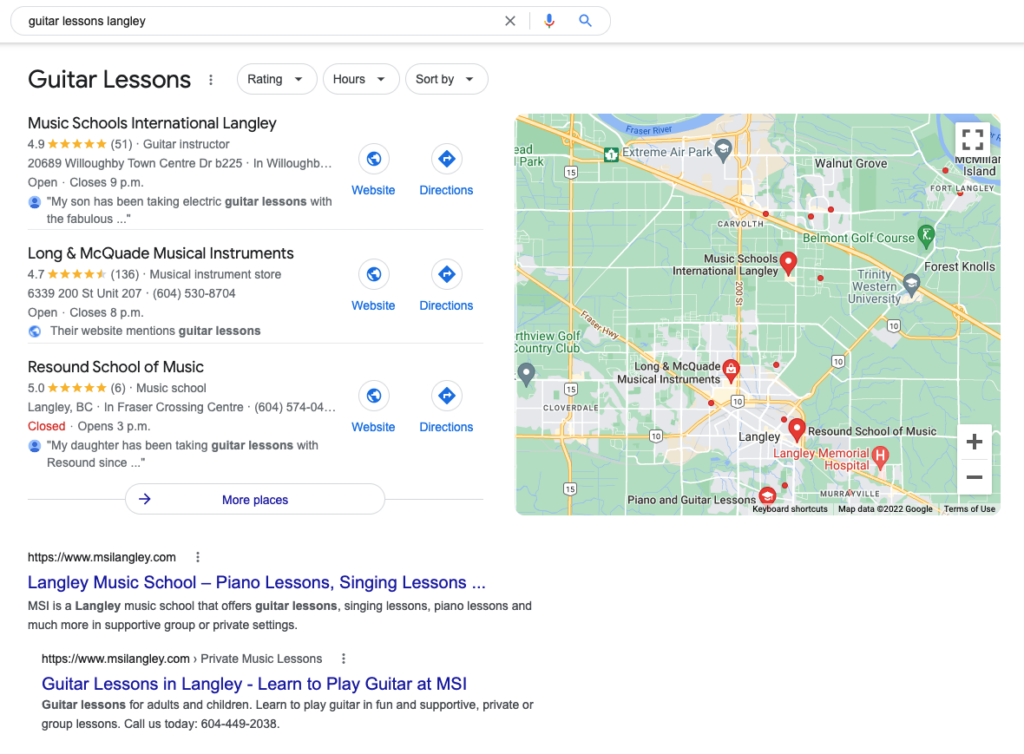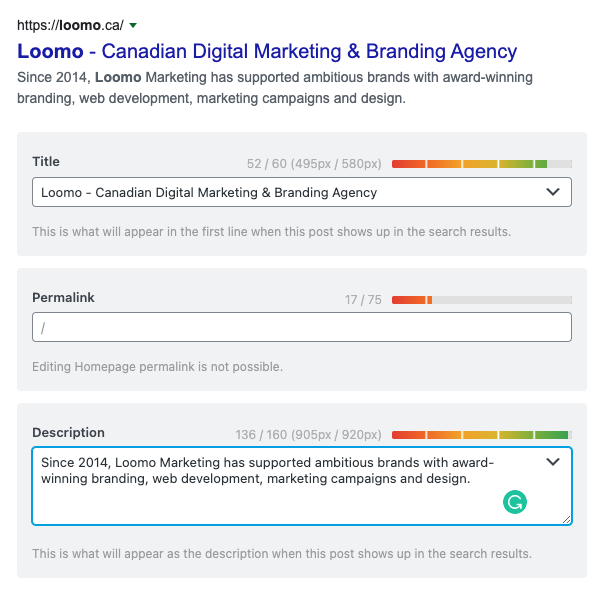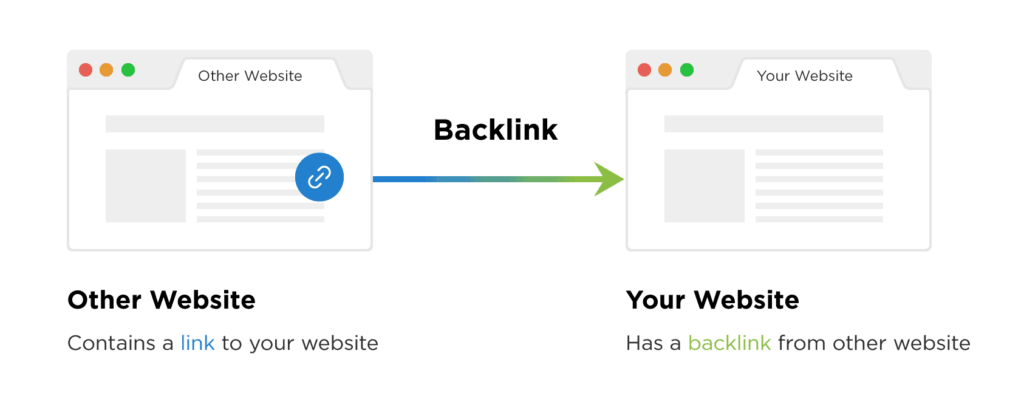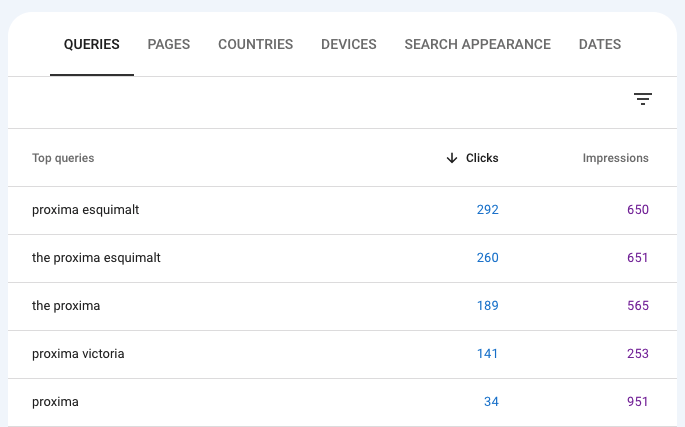Wondering what SEO is and how to make use of SEO strategies for your business? This is the post for you!
SEO is a term that stands for “Search Engine Optimization.” It’s the practice of working to make your site more visible, or likely to be shown on search engine results pages (SERPS). When potential consumers look for keywords connected to your company, a well-optimized web page means that they will have a better chance of finding your website and you get the chance to convert them into a client.
For example, let’s imagine that you run a music school. On your website, you offer a list of available music lessons and might also have a few blog posts about how to become a rocking guitar player. With good SEO practices, a person searching for keywords like “guitar lessons Langley” might have a better chance of finding your articles and website—and therefore, your brand. Simple, right?

The trouble is, most business owners don’t have time to build, review, and adjust their SEO strategy each month while also managing their regular day-to-day duties. That’s where agencies like Loomo come in to help grow your online presence and let you get back to doing what you do best. So, what does it mean to implement an SEO strategy? While this is by no means exhaustive, here are five effective SEO strategies that marketers use to help grow your business.
1. Regularly publish high-quality content.
One of the best ways to improve your SEO is to regularly publish high-quality content. This includes the main pages of your website but can also include other content such as blog posts, infographics, product reviews, and more. When a user enters a query into a search engine, such as Google, that search engine evaluates which pages and sites in their index are best suited to fulfill that user’s needs.
Technically speaking, to accomplish this, algorithms examine how well the websites in their index match what a user is looking for. At the same time, each website’s characteristics, such as load time, technical specifications, link structure, and relevance, are considered. These processes then generate a final list of search engine search results.
In short, the more closely your page content matches a person’s search query (what is entered into the search engine), the more likely it is to achieve a higher ranking on the list of results.
How do you create this content? Whether you do it yourself or work with an agency, the best place to start is to ask “What are my clients looking for?” Then, write content that answers those questions. For our music school, the following subjects might be a great start:
- How to choose the right music teacher.
- Choosing the right instrument to learn.
- Getting started with music. Five beginners’ tips for a life of musical joy.
2. Pay attention to page titles and meta descriptions.
Getting a bit more granular, page titles and meta descriptions are two important elements that influence how your page ranks in SERPs. That’s because they are the first thing search engines and potential customers see when they search for keywords related to your business.
In most search engines, the name of your page will be used as the main clickable link to your site. See the example below.

As you can see, the title is what appears in blue and is underlined. This is also the hyperlink to your website. The meta description is the short summary of your page that appears beneath the title in the search results. In our example, it’s the text that reads “Guitar lessons with our highly trained guitar teachers…” This is your first chance to describe what customers can expect to find on your website and persuade them to click through and learn more.
If you are using a platform like WordPress, tools like Yoast and Rank Math allow you to customize your page titles and meta descriptions on a page-by-page basis. Using our own website as an example, you can see fields that let us customize what is shown for our page title and meta description in search engines. As in strategy one, you must ensure that the titles and descriptions you use are as relevant to the page content as possible.

3. Build backlinks to your website.
One of the most important ranking factors for SEO is the number of backlinks pointing to your website. Backlinks are important because search engines see backlinks as votes of confidence from other websites. The logic is that if other websites are linking to your website, then your website must contain valuable information. You can increase your backlinks by guest blogging, submitting your website to directories, and creating informative infographics that can be shared on social platforms like Reddit, Quora, and more.

4. Use social media to your advantage.
While social media does not have a direct impact on SEO, the social signals (likes, shares, and comments) created by people who share your content on social networking sites can help to create trust and customer loyalty, as well as brand recognition and exposure. All of these things increase your online visibility and traffic indirectly.
Additionally, social media sites like Facebook and Twitter offer ample opportunities for creating high-quality backlinks (see strategy three) that you have control over (you don’t need to ask for them from other blogs or businesses). Then when your content gets reshared and reposted by social media users, backlinks to your website are created over and over again. Good news for how search engines view your site.
5. Monitor your progress with analytics tools.
Last but not least, it’s important to keep track of your SEO progress over time so that you can see what is working and what still needs to be adjusted. Free tools like Google Analytics, Google Search Console or paid tools like SEMrush allow you to do just that.
Google Analytics and Google Search Console are industry-standard tools that track site traffic and search queries by adding a tracking code to your site. You can then dive into the key search terms that people use to find your website and see how often they click on those terms. Over time, you can work to build more relevant content and increase the number of clicks to the terms that are most relevant to your business.

You’ll be able to see how effective your SEO strategies are based on what pages people are clicking on, what keywords are being used to find your site, and how your traffic grows over time.
Hopefully, this post has helped give you a better idea of what SEO is and how SEO strategies can be used as an important aspect of your digital marketing campaign. By following the five strategies we’ve outlined, you can improve your visibility and attract more leads from potential customers.
If you want help to start seeing better results from your website, contact us today to get started with our team of experts. We’ll help you create a plan that uses SEO to its full potential and drives conversions for your business.


